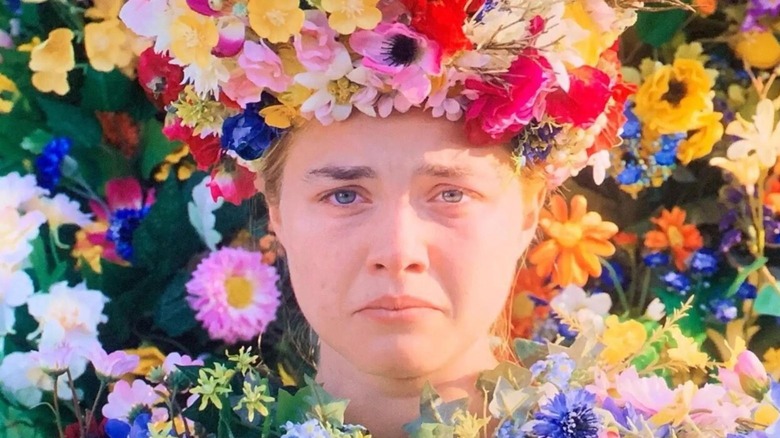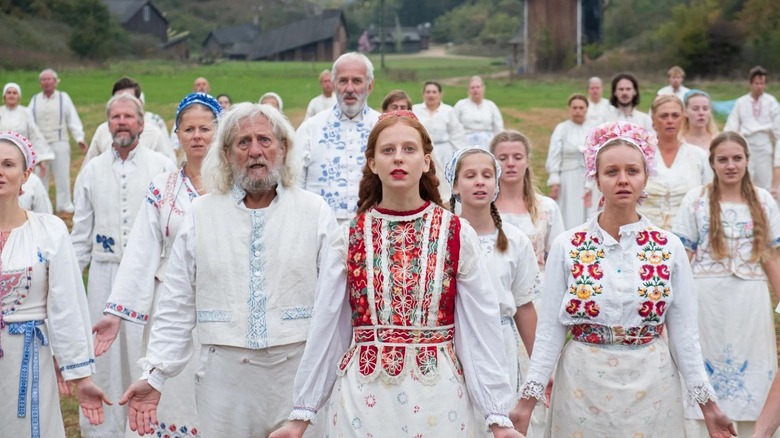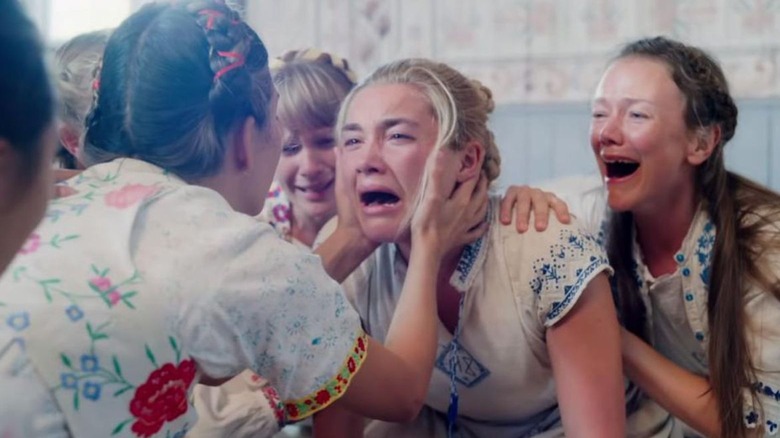Ari Aster Never Saw Midsommar's Village As A Cult
Ari Aster's "Midsommar" isn't your typical horror movie — the filmmaker delivers plenty of shocks and has enough to frighten the wits out of you while balancing its horror tale with commentary on trauma, relationships ... and cults. The film centers on Florence Pugh's Dani, a young woman grappling with a family tragedy. When she accompanies her boyfriend and their friends to a midsummer celebration in Sweden, they find themselves surrounded by a sinister cult practicing Scandinavian paganism.
Now to anyone who has watched "Midsommar" before — there's no denying the Harga community is a cult that disguises its horrifying practices with a happy-go-lucky exterior. The film is a daytime nightmare that depicts how cults recruit new members — by turning them against each other through targeted manipulation. Aster creates a genuinely horrifying history for the Harga villagers — but the filmmaker doesn't consider them to be a cult.
Breaking down the Harga community
In an interview with Vox, Aster explained how he didn't see the Harga people as a cult ... but as a "community" and a "family."
To them, they're in sync with their traditions, the earth, and the changing seasons; they're in touch with themselves and each other about their ceremonial practices. They don't appear as dangerous ... as Aster says, there's "no mustache-twirling or arched eyebrows." And they genuinely believe they're doing the right thing.
Aster explained that his perception of the Harga community depended on where he was in the filmmaking process.
"... When I was working with the Swedish actors, it was very important to me that [the villagers, called the Harga] not be menacing. They're not foreboding. There's nothing foreboding about them. They love this world. They believe in what they're doing. They're absolutely fair. They love each other. They are just completely in touch with themselves and their lives and each other. That's all it was with them."
'I don't see them as a cult'
The "Hereditary" director agreed the Harga community had no defining traits a cult usually did — there wasn't a leader, and there was nothing supernatural about them. Aster wanted Harga to be full of history and tradition.
He added: "No, I don't see them as a cult. They might be. But I never called them a cult. For me, they are a community, and they are a family. I wanted them to exist as a place with a history and very clear laws and rules and traditions. I wanted all that to feel very rich, and very lived in."
The ritualistic practices are highly questionable, yes, but until forced to participate in them, the village seems like a fairy tale to its protagonist. Pugh's Dani is at her lowest point and needs a family to support her — and when she's able to find one in the village, no matter the technicalities, she holds on.
"At the same time, this is a fairy tale, and they really are exactly what Dani needs. For better or worse, this is a wish-fulfillment fantasy. This is truly a spoiler, but: We begin as Dani loses a family, and we end as Dani gains one. And so, for better or worse, they are there to provide exactly what she is lacking, and exactly what she needs, in true fairy tale fashion."
"Midsommar" is scary — the ending is brutal and violent, and you simply cannot gauge what the Harga villagers will do next. Witnessing their brutality becomes a life-altering experience for Dani. Before she knows it, she has been dragged in too deep and is falling down a rabbit hole from which there's no escape.


